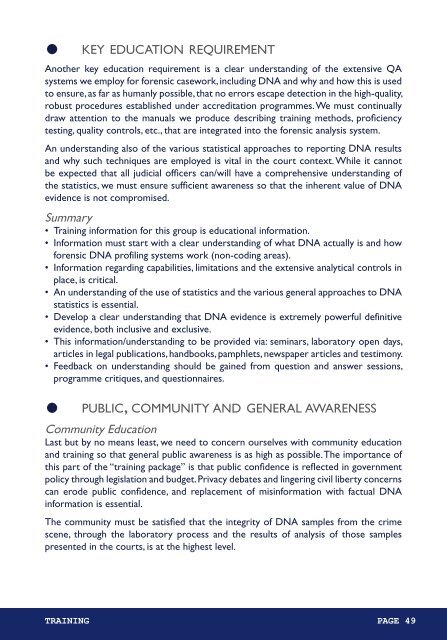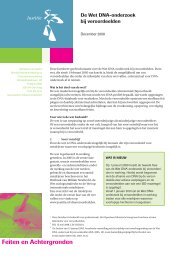INTERPOL HANDBOOK ON DNA DATA EXCHANGE AND PRACTICE
INTERPOL HANDBOOK ON DNA DATA EXCHANGE AND PRACTICE
INTERPOL HANDBOOK ON DNA DATA EXCHANGE AND PRACTICE
You also want an ePaper? Increase the reach of your titles
YUMPU automatically turns print PDFs into web optimized ePapers that Google loves.
•key education requirementAnother key education requirement is a clear understanding of the extensive QAsystems we employ for forensic casework, including <strong>DNA</strong> and why and how this is usedto ensure, as far as humanly possible, that no errors escape detection in the high-quality,robust procedures established under accreditation programmes. We must continuallydraw attention to the manuals we produce describing training methods, proficiencytesting, quality controls, etc., that are integrated into the forensic analysis system.An understanding also of the various statistical approaches to reporting <strong>DNA</strong> resultsand why such techniques are employed is vital in the court context. While it cannotbe expected that all judicial officers can/will have a comprehensive understanding ofthe statistics, we must ensure sufficient awareness so that the inherent value of <strong>DNA</strong>evidence is not compromised.Summary• Training information for this group is educational information.• Information must start with a clear understanding of what <strong>DNA</strong> actually is and howforensic <strong>DNA</strong> profiling systems work (non-coding areas).• Information regarding capabilities, limitations and the extensive analytical controls inplace, is critical.• An understanding of the use of statistics and the various general approaches to <strong>DNA</strong>statistics is essential.• Develop a clear understanding that <strong>DNA</strong> evidence is extremely powerful definitiveevidence, both inclusive and exclusive.• This information/understanding to be provided via: seminars, laboratory open days,articles in legal publications, handbooks, pamphlets, newspaper articles and testimony.• Feedback on understanding should be gained from question and answer sessions,programme critiques, and questionnaires.•public, community and general awarenessCommunity EducationLast but by no means least, we need to concern ourselves with community educationand training so that general public awareness is as high as possible. The importance ofthis part of the “training package” is that public confidence is reflected in governmentpolicy through legislation and budget. Privacy debates and lingering civil liberty concernscan erode public confidence, and replacement of misinformation with factual <strong>DNA</strong>information is essential.The community must be satisfied that the integrity of <strong>DNA</strong> samples from the crimescene, through the laboratory process and the results of analysis of those samplespresented in the courts, is at the highest level.TRAINING PAGE 49







